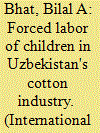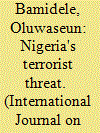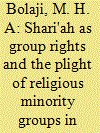| Srl | Item |
| 1 |
ID:
124498


|
|
|
|
|
| Publication |
2013.
|
| Summary/Abstract |
Lack of skilled manpower, sophisticated technology and marketization are a new basis for child labor in central Asia, particularly in Uzbekistan. Agriculture , which comprises 40 percent of GDP of Uzbekistan, has present GDP of Uzbekistan, has turned backwards from the Soviet period when refined technology was provided when refined technology was provided by Russias.
|
|
|
|
|
|
|
|
|
|
|
|
|
|
|
|
| 2 |
ID:
124496


|
|
|
|
|
| Publication |
2013.
|
| Summary/Abstract |
The most immediate threat to the security of Nigeria is the Islamist insurgency raging in its north east region. Deadly attacks have killed a large number of people, devastated infrastructure, and hindered military success in this region and beyond. High ranking members of Al-Qaida may have been harbored, and the insurgents are affiliated with various militant sects, who pose a threat to wider sub Saharan Africa, especially Nigeria.
|
|
|
|
|
|
|
|
|
|
|
|
|
|
|
|
| 3 |
ID:
124497


|
|
|
|
|
| Publication |
2013.
|
| Summary/Abstract |
This article investigates how Shari'ah penal codes, as group-differentiated rights, jeopardize the rights of minority groups in northern Nigeria. The first section explores the concepts of individual and group rights in legal discourse. This is followed by an account of Shari'ah penal codes in northern Nigeria. Then, it examines the political expression of collective identity as group-differentiated rights, and how this expression of collective identity through Shari'ah law has endangered the rights of the members of minority religious groups in northern Nigeria. The paper concludes that, to address the emerging dysfunctional dimensions of Shari'ah, government must work with Islamic civil organizations so as to emphasize the welfare aspects of Shari'ah, and liaise with reputable northern Nigerians to appeal to the members of the Boko Haram to lay down their arms.
|
|
|
|
|
|
|
|
|
|
|
|
|
|
|
|